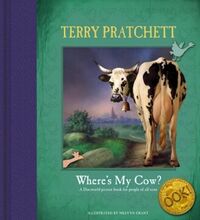Book:Where's My Cow?: Difference between revisions
m (1 revision: Book Namespace) |
(No difference)
|
Revision as of 17:57, 29 September 2012
| Where's My Cow? | |

| |
| Co-author(s) | {{{coauthors}}} |
| Illustrator(s) | {{{illustrator}}} |
| Publisher | Doubleday |
| Publication date | 2005 |
| ISBN | 038560937X |
| Pages | |
| RRP | {{{rrp}}} |
| Main characters | Samuel Vimes Young Sam Lady Sybil Ramkin |
| Series | [[:Category:|]] |
| Annotations | View |
| Notes | Book #36 |
| All data relates to the first UK edition. | |
Blurb
This is a book about reading a book, which turns into a different book. But it all ends happily!
Storyline
Every day at 6:00pm sharp Sam Vimes reads the book "Where's My Cow?" to Young Sam. But one day Vimes decided that it makes no sense to read about animals which Young Sam will never see alive. Therefore, he changes the story of the book a little to be more interesting for someone living in Ankh-Morpork.
About the book
Where's My Cow? is an illustrated novel. However, it is not comparable to previous illustrated novels as Eric and The Last Hero, because its appearance is that of a children's book. It is intentional and suits the story that some of the drawings could have been taken right of a book for two-year-olds. There is very little text in the book which has only 14 pages. Nevertheless, this great book shows Commander Vimes in a totally different light as in the Watch Books and is therefore a "must have".
A spin-off from Thud!, this is a book ostensibly aimed at very young children.
In Thud!, this is the very favourite bed-time reading for Young Sam Vimes - the chew-marks on the cover are an endorsement of its all-time-favourite status. Young Sam must never be without his father at six in the evening for his night-time ritual. This is the thing that keeps Samuel Vimes straight and reminds him that he is more than just a policeman - the six o'clock ritual is something he never misses, and it ingrains such a habit in him that he will do positively insane things to be home an up in the nursery at six o'clock, every evening, without fail. This becomes an integral plot-device of Thud! - the deeply ingrained, almost magical, habit of sanity and normal fatherhood presents the very last insurmountable barrier that not even the Summoning Dark can break.
Therefore, how could this book-within-a-book not make it out of the pages of Thud!,and be published in its own right?
Ostensibly about the trials and tribulations of a farmer seeking for his lost cow, and written in language suitable for very young people, bound in green and purple covers capable of withstanding the most determined chewing, the older reader may develop a suspicion that there is a deeper level to this book...
Terry Pratchett's text and the artwork of Melvin Grant combine to present a different sort of Discworld, with many of the familiar characters re-imagined through Grant's lovely artwork.
Go on, you know you want to buy it, if only to complete your Pratchett collection. See how many of the characters you can recognise in the artwork without prompting or needing to consult the Wiki...
Reviewed favourably in the Ankh-Morpork Times by its renowned literary critic, Tuppence Swivel.
Characters
Main characters
Mentioned
Keen eyed readers should also look carefully at the portrait in Young Sam's room...
Release information
- Originally published in the Year of Three Horses by Rouster & Sideways, 33b Gleam Street, Ankh-Morpork (please use rear staircase; closed on Fridays)
- This edition published by Doubleday
- Text copyright (c) by Terry and Lyn Pratchett 2005; Illustrations copyright (c) Melvyn Grant 2005
Annotations
Yes, it even sustains these.
- Where's my daddy?
- Is that my daddy?
- It goes "I fink, derefore I am. I fink".
- It is Sergeant Detritus the troll!
On the Moody Blues' 1969 LP On The Threshold of a Dream, the very first spoken words are those of flute player and singer Ray Thomas, who is going through a similar sort of existential angst:
- "I am, I think I am. Therefore I must be. (pause, then uncertainly) I think..."
And both, of course, are riffs on René Descartes' pithy aphorism concerning the primacy of thought and personal identity. (But what else would a troll resonate to apart from rock music...)
Artwork
Drawn in the style of a children's picture book, this is an opportunity to use an illustrator other than the great Kidby, and to explore familiar Discworld characters in a different style.
Melvyn Grant takes over the artwork for this book, and his conception of Sam Vimes appears to be very much in keeping with Terry Pratchett's stated perception of the character as "looking like a young Pete Postlethwaite".